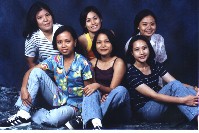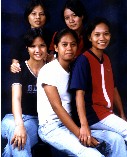PSYCHOCULTURAL DYNAMICS OF CAREER & STUDY CHOICES—A PILOT STUDY
![]()
Rogen Alcantara, Luel de Jesus, Deborah Salem, Florence Tejada, Michelle Valbuena, Regina Villaluz (graduate students), June Honculada, Anna Lourd Villanueva, et al. (undergraduate students) of the Special Topics Seminars of Dr. Fred Abraham, Department of Psychology, Silliman University, Dumaguete City.
![]()
ISSUES: A study by Mark Poster (1989) challenged the hypothesis of Chirstopher Lasch (1984) that modern conditions of culture, especially the fast emergence of mass/global modes of communication, were creating narcissistic youth with weak ego-strength and lack of independent self-development, concepts driven by psychoanalytic theory. The results of his survey suggested that indeed there were changes in the family style since the Oedipal family of Freud's time a century ago. But the more democratic, laissez-faire family of contemporary American Society, in which Poster did his study, did not display erosion of ego-strength or self-actualization. The stereotypic view of the middle-class Filipino family as large, cooperative, patriarchal, religious, extended family raises the possibility that university students may be intermediate between the Oedipal independence and competitiveness of the Amero-European cultural style, and the narcissism of dependence of decision-making on others of the group (family, church, or barkada1)
METHODS: In this pilot study, our graduate students developed a lengthy (75 item, 45 min) questionnaire, of four parts. 1. Career Objectives and Course of Study, including some demographics and exploration of possible familial conflict with regard to those choices. 2. Coping with Success and Failure, including some straightforward questions on attribution/locus of control issues as a modern theoretical framework regarding strength of self. 3. Family. Includes family data and attitudes toward family structure and dynamics. 4. Gender Issues. These probe the interaction of perceived career with perceived gender variables as well as attributional and familial variables. Students (68 majors) in both sections of the upper level Special Topics in Psychology course served as both subjects and experimenters. The initial probes of the data are mainly frequency tabulations and cross tabulations and c 2 tests goodness of fit and of relationships among selected pairs of items.
SOME EXAMPLE RESULTS: Part 1. There were 40 shiftees2, 14 of which shifted more than once, indicating some independence (and indecision) in choice of study. Many students were unsure of their career choices; levels of conflict with family were low but prevalent enough to be a guidance issue. Part 2. Students tended to take credit for successes (77%) but blame others for their failures (62%) in general (global attribution), but with poor course work (specific attribution) they tended to accept blame. Again, this indicates pretty good ego-strength. Part 3. Both parents usually had jobs and participated in family and decision making and chores with some traditional division of labor despite having domestic helpers and a significant divorce rate. Thus families were more democratic and participatory than the traditional Freudian Oedipal family (like the Poster result), more modern despite the strong Catholic religious aspect which differed them from the Poster/American study. Part 4. Less than 1/3 felt there was gender bias in job availability, pay, or achieving top level positions; only two students felt women should stay in the home instead of the workplace. (There were only 5 males in the sample.) Highly significant c 2s showed, surprisingly, that perceived job pay and availability for women were seen as fair despite the tendency to attribute blame to others by these mostly female students
CONCLUSIONS: Many interesting features of student psychodynamics are revealed which are a mixture of some deviation from stereotyped views of Filipino middle-class family style despite some defensive conformity to socially accepted norms, and despite some naivete in our questionnaire construction. These answers revealed the difficulty of getting at psychodynamics via questionnaires, and show the need for ethnographic and text analytic supplements for such a research program. They provide not only a small contribution toward a Sikolohiyang Pilipino3, but also highlight the importance of doing cultural psychology and of using the Philippines as a lab for studying fast cultural change.
NOTES:
1 Barkada is a group of friends
2 Shiftees are those who change majors, in this case into Psychology
3 Sikolohiyang Pilipino is Philipine Psychology
REFERENCES:
Lasch, C. (1984). The Minimal Self: Psychic Survival in Troubled Times.
Poster, M. (1989). Poststructualism & Critcal Thinking. Chapter 8.
Submitted, by Fred Abraham, Visiting Professor of Psychology and Graduate Studies, Silliman University, Dumaguete City, Philippines, and Visiting Scholar of the United Board for Christian Higher Education in Asia. Submitted for a student poster presentation at the Annual Conference of the Psychological Association of the Philippines, January 6-8, 1999, Manila
 |
 |
 |
![]()
Posted: 11/28/1998.